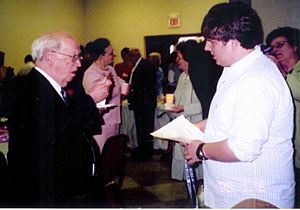Fred Craddock facts for kids
Quick facts for kids
Fred Craddock
|
|
|---|---|

Craddock discussing homiletics with a student.
|
|
| Born |
Fred Brenning Craddock, Jr.
April 30, 1928 Humboldt, Tennessee, United States
|
| Died | March 6, 2015 (aged 86) Blue Ridge, Georgia, United States
|
| Nationality | American |
| Occupation | Preacher, Professor |
| Spouse(s) |
Nettie Dungan
(m. 1950–2015) |
| Children | John Craddock Laura Craddock |
Fred Brenning Craddock, Jr. (born April 30, 1928 – died March 6, 2015) was a highly respected professor and preacher. He taught at Emory University's Candler School of Theology. He was known for his work in preaching and studying the New Testament.
He was also an ordained minister. He belonged to the Christian Church (Disciples of Christ). Fred Craddock grew up in rural Tennessee. He also led the Craddock Center. This non-profit group helps people in the rural Appalachian Mountains.
Contents
Books by Fred Craddock
Fred Craddock wrote many important books. These books often shared his ideas about preaching. Some of his well-known works include The Pre-Existence of Christ (1968) and As One Without Authority (1971).
He also wrote Overhearing the Gospel (1978) and Preaching (1985). He wrote commentaries on parts of the Bible, like the books of John, Philippians, and Luke. He even published a collection of stories related to sermons, called Craddock Stories (2001).
Craddock's Preaching Style
Fred Craddock had a special way of preaching. It was different from older, more traditional styles. He wanted listeners to be active, not just sit and listen.
Inductive Preaching
One main difference was his "inductive" approach. Traditional sermons often state three points and then explain them. Craddock did the opposite. He would guide listeners through a journey of discovery.
He wanted the audience to think along with him. This way, they would reach the sermon's main idea themselves. It was like solving a puzzle together.
Creating an Experience
Craddock believed a sermon should create an experience for the listener. It wasn't just about giving facts or telling people what to believe. He wanted the sermon to make people feel and understand the message deeply.
Because of this, listeners became active participants. They weren't just receiving information. They were helping to "finish" the sermon in their own minds. This made the message more personal and powerful.
Using Humor
Fred Craddock was also known for using humor in his sermons. His style was often described as "folksy." This made his talks enjoyable and easy to connect with.
Newsweek magazine even called him one of America's greatest preachers. His ideas have influenced many other preachers. They have helped create new ways of giving sermons.
Lectures and Teaching
Many universities invited Fred Craddock to speak. He gave important lectures at places like Yale and Vanderbilt. He also spoke at the Claremont School of Theology and Pittsburgh Theological Seminary.
He was a popular speaker at the Christian Scholars Conference. In 2007, he was the Founder's Day speaker at Johnson University. This is where he earned his college degree. He taught about the Bible and Homiletics (the art of preaching) there.
About Fred Craddock's Life
Fred Craddock was born in 1928. His parents were Fred, Sr. and Ethel Craddock. He had three brothers and one sister.
In June 1950, he married Nettie Dungan. This was right after he graduated from Johnson Bible College. They had two children, a son named John and a daughter named Laura.
 | Aaron Henry |
 | T. R. M. Howard |
 | Jesse Jackson |

